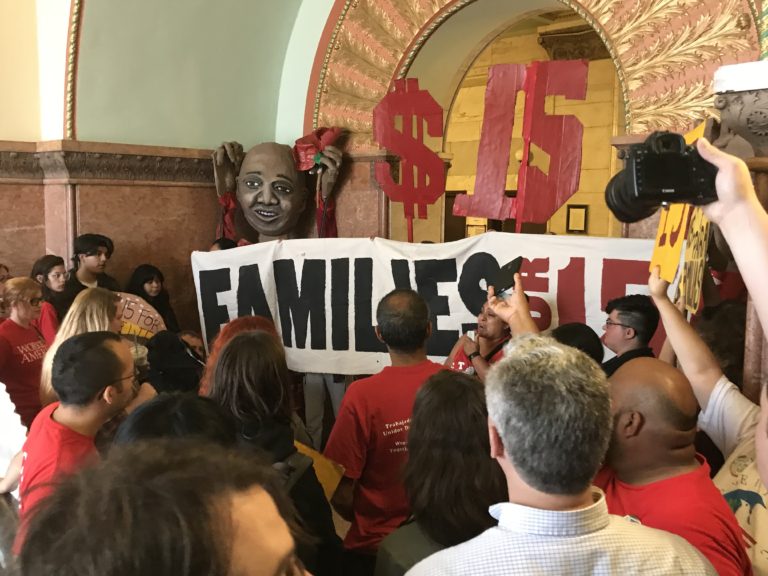

Share
Citizens of all backgrounds – including many low-wage workers – packed Thursday’s public hearing at Minneapolis City Hall on the City Council proposal for a $15 minimum wage.
The hearing stretched from midafternoon to late evening, with the majority of people testifying in support of the higher wage. An increase from the current $9.50 state-mandated minimum wage to $15 an hour would give a raise to 71,000 workers, disproportionately workers of color, immigrant and female workers.
“I work at Pizza Luce in the back of the house and we need to raise the minimum wage to $15 and still be able to get tips as well,” said Donell Martin, a member of CTUL, Centro de Trabajadores Unidos en Lucha/Center for Workers United in Justice. “We cannot survive on anything less than that.”
Leaders of several unions spoke in favor of the effort.
“MNA is here to say we support the $15 minimum wage ordinance,” said Minnesota Nurses Association President Mary Turner.
“Night after night we see people coming into the emergency room because they have inadequate housing, inadequate food” and lack access to proper medications due to poverty, she said. “This is a public health crisis.”
Paul Mueller, vice president of Education Minnesota, said educators see a direct connection between higher wages and better performance in school. “After working with thousands of students, I can tell you it [a higher minimum wage] makes a big difference for our students,” he said.
Wade Luneburg, secretary-treasurer of UNITE HERE Local 17, the union representing Twin Cities hospitality workers, said the City Council needs to act because the state and federal governments have failed to raise the minimum wage.
“We cannot afford inaction,” he testified. Luneburg also said Local 17 would continue to press for broader efforts to raise the wage and make sure “there is a level playing field for all businesses.”
Opposition to the ordinance centered mostly on its effect on workers who receive tips. Some restaurant owners and employees testified they believe tips should be counted toward the minimum wage.
Fred Navarro, owner of George and the Dragon Pub in Minneapolis, said, “Our tipped employees make an average of $35 an hour” and tips should be counted toward their wages. Navarro said that as the owner, he takes all the financial risk and earns less than his employees.
“This is the reality of small business,” he said.
But Jennifer Pritchett, owner of Smitten Kitten in Minneapolis, said, “You can do it as a small business. You can raise your minimum wage.”
“A $15-an-hour base wage plus tips is a living wage, and anything less than that leaves tipped workers behind,” said Alex Doebler, a bartender at Buca di Beppo in downtown Minneapolis. “Raising the wage for servers has never caused the apocalyptic outcomes the restaurant lobby claims and doesn’t end tipping. One Fair Wage is the right path for Minneapolis.”
The hearing comes after years of community organizing and strikes in pursuit of a higher wage for all workers in Minneapolis. Last summer, the campaign collected more than 20,000 signatures to put the issue directly to voters through a ballot initiative. While polls showed broad support among the public, the state Supreme Court ruled the ballot initiative was preempted by state law.
The City Council, facing pressure to act, then moved forward on its own ordinance. The council is expected to discuss amendments to the proposal on June 28 and take a final vote on June 30.

